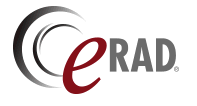 PACS
Desktop Viewer
PACS
Desktop Viewer
 PACS
Desktop Viewer
PACS
Desktop Viewer
This next section will provide more in depth information regarding the hanging protocol tool group with regards to grids, tiles and the layout edit mode. The viewer allows the user to define the viewing workspace, organize the images, and save the settings as a hanging protocol.

The Grids
matrix, by default, will split the screen into symmetrical groups
of image frames. When the Grids
matrix ![]() is selected in the
tools group, a dropdown panel appears showing open frames.
is selected in the
tools group, a dropdown panel appears showing open frames.
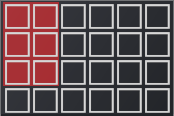
Dragging the mouse from the top left corner down will allow the user to draw or define a generic layout for the image frames. The image above shows the frames in a 2 x 3 layout with the frames highlighted red.

The Tiles
matrix applies a tile pattern to a selected frame, controlling
the number of images displayed in the frame. When the Tiles
matrix ![]() is selected in
the tools group, a dropdown panel appears that allows the user to draw
a tile layout.
is selected in
the tools group, a dropdown panel appears that allows the user to draw
a tile layout.
To apply a tiles matrix:
Select an image frame
Select
the tiles matrix icon ![]()
Drag mouse to define tile layout
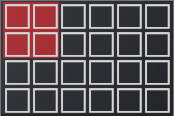
The selected image frame will now show images in the series as 2 x 2 tiles within the frame.
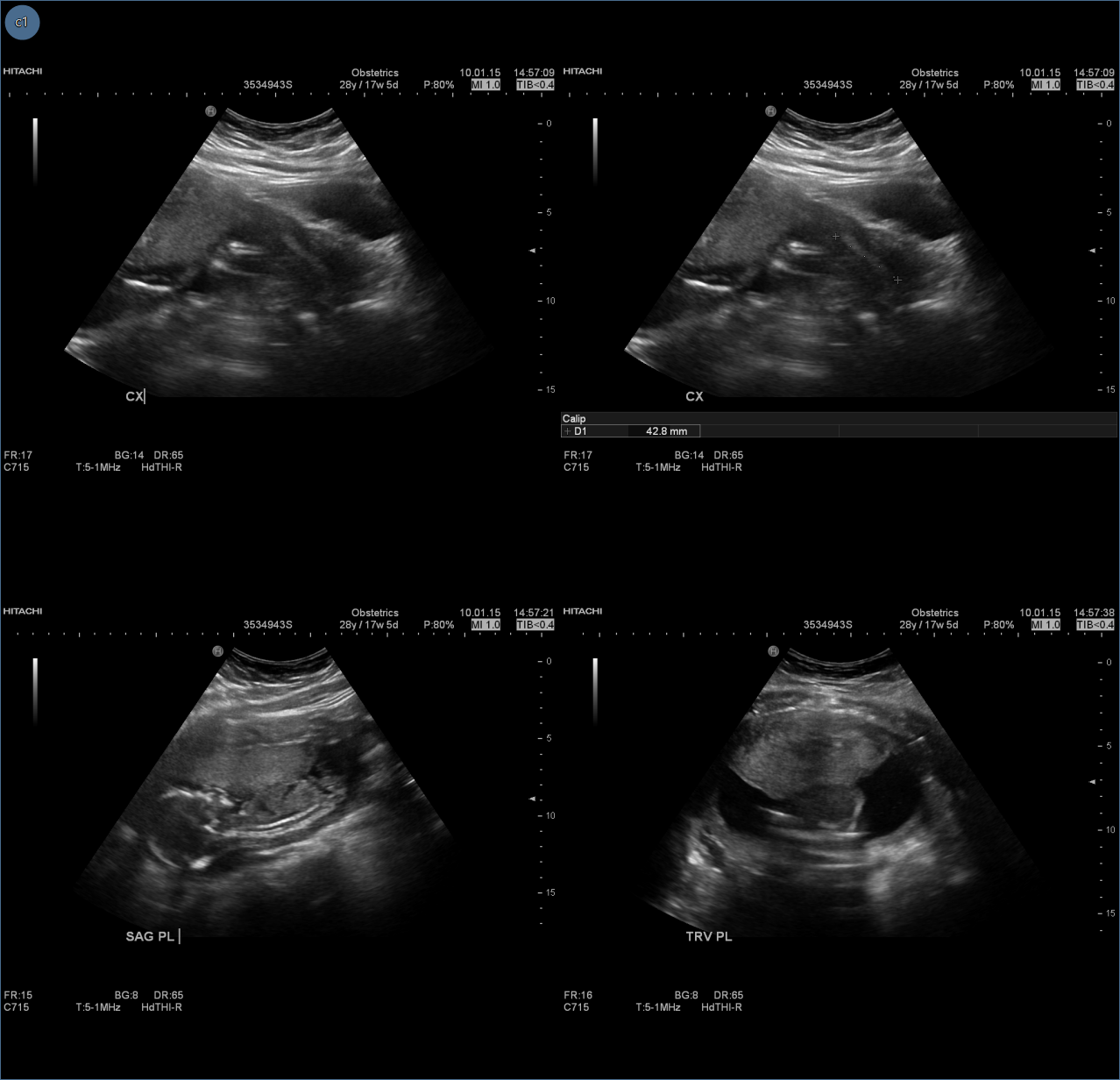

The Grid fill mode list is an expandable menu containing four icons. These determine the layout of the images when used in accordance with the grid matrix function. When one of the Grid fill mode list options is selected, the icon for that function will change to match.
To use the Grid fill mode list:
Make a selection from the Grid fill mode list
Select Grids matrix ![]() icon to create the
custom frame layout
icon to create the
custom frame layout
The available Grid fill mode list functions are:
Empty Cells
Reused Cells
Selected Study
All Study
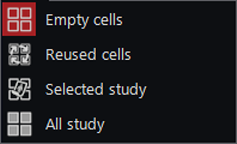
Empty Cells
When this option is selected along with the Grids matrix layout, the frames will contain no images. This allows the user to drag and drop images from the thumbnail panel into desired frames.
Note: This mode is recommended when creating body part specific hanging protocols.
Reused Cells
This option selected along with the Grids matrix layout will change the layout of the frames but will preserve previously loaded images that were dragged into frames without changing their location in the viewer frames. These images will not be re-ordered or re-hung when the new layout is created.
Selected Study
When this option is selected along with the Grids matrix layout, a selected study in the thumbnail panel can be designated for image frame loading. When the user clicks on the thumbnail study header a yellow border will surround the images. Those will load into the frames in the same order of the thumbnail study as shown below.

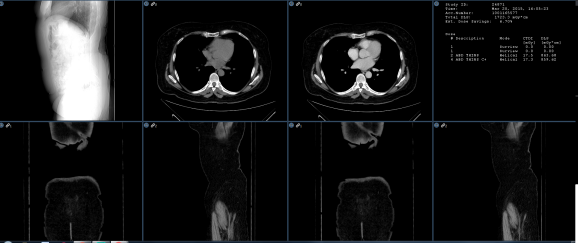
When loading priors, selecting the study header and highlighting the series will only load those selected priors after grid matrix frame layout is created.
All Study
When this option is selected along with the Grids matrix layout, the viewer will load all open studies (current and prior) into available image frames. If there are too many images for the number of frames available, a virtual monitor will appear in the top right corner of the image frame in order to accommodate the images. These are shown highlighted in yellow in the image below. The selected virtual monitor is highlighted red.
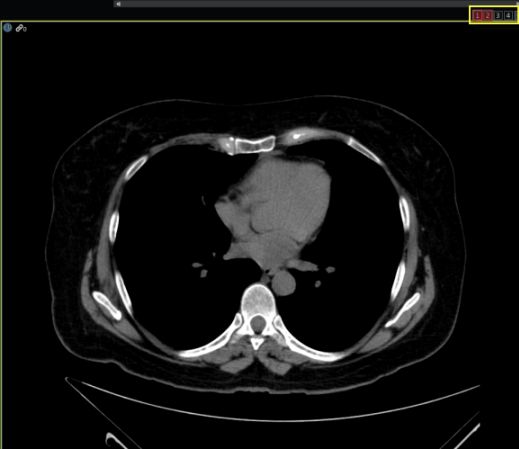
Note: A macro shortcut can be created to enable switching back and forth between the virtual monitors.

When the lock grid lines icon ![]() is
selected or unlocked, the user is able to resize the image frames. When
grid lines are locked, that icon will be highlighted red.
is
selected or unlocked, the user is able to resize the image frames. When
grid lines are locked, that icon will be highlighted red.
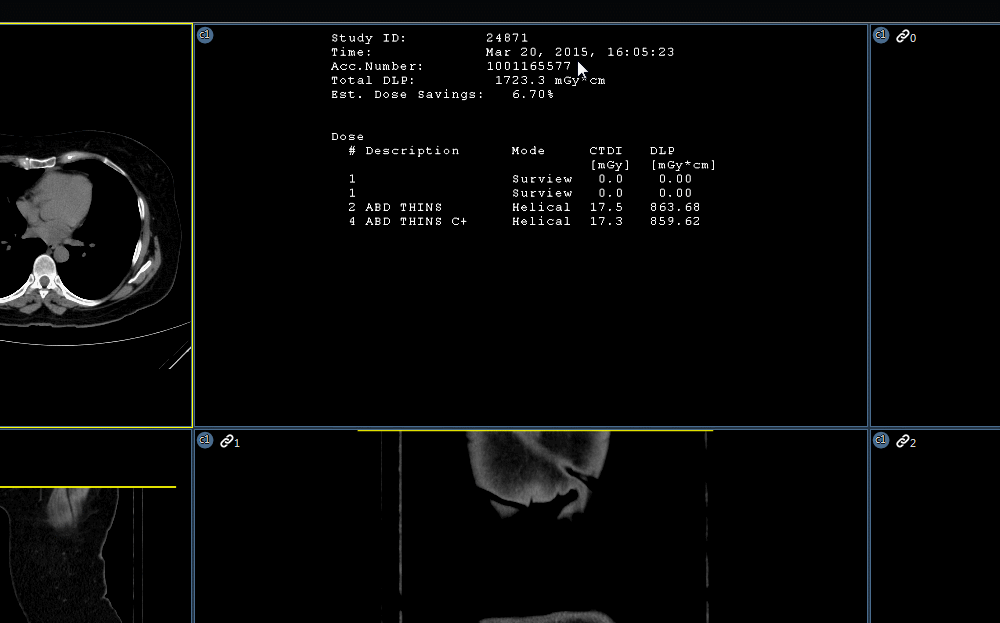

When the layout edit mode icon ![]() is
selected, icons will appear on the periphery of the image frames that
can be used to add frames, split a frame in half or merge frames into
one. Some of these icons will appear when hovering over the image frame.
is
selected, icons will appear on the periphery of the image frames that
can be used to add frames, split a frame in half or merge frames into
one. Some of these icons will appear when hovering over the image frame.
| Icons | Function |
|
When located on top left corner of frame creates an empty frame to the left |
|
When located
on bottom of frame along with |
|
Doubles the frames either below or above frame depending on location |
|
When located
on top of frame along with |
|
Splits a frame in half |
|
? |

Reset Layout and Reset Layout Page
Located in the Layout menu group are the Reset Layout and Reset Layout Page functions. When these functions are selected the layout created will be erased and will be reset to an empty image frame. When Layout Edit Mode is activated, a grids matrix will be located in the center of the image frame to customize another layout.